NFTs have gained significant attention and popularity across various industries, including art, music, gaming, and entertainment.
Now, it has spread to Alcohol businesses.
NFTs have the ability to provide a secure and transparent way to verify ownership and authenticity of digital assets. But why Alcohol companies are using them?
Let’s dive deep!
First of all..
What’s an NFT?
Non-Fungible Tokens (NFTs) are cryptographic assets that represent ownership or proof of authenticity of a unique item or piece of content on a blockchain.
One key characteristic of NFTs is their uniqueness and scarcity, which makes them particularly valuable for digital collectibles, art, virtual real estate, and other forms of digital content where authenticity and ownership are important.
Ok, but what do Alcohol brands have to do with NFTs?
Alcohol brands are increasingly exploring ways to leverage this technology to engage with consumers and enhance their marketing strategies.
By minting NFTs linked to their products or brand experiences, alcohol companies can offer unique and exclusive digital collectibles, virtual events, or other immersive experiences to their customers.
For example, a whiskey distillery might release a limited edition bottle accompanied by an NFT that grants the owner access to a virtual tasting event with the master distiller.
Similarly, a wine producer could create NFTs representing ownership of rare vintages or access to private vineyard tours.
The NFT is essentially the title to a particular, unique bottle of alcohol, and the owner may redeem the NFT for the physical item. The NFT ain’t the bottle here.
It just can give you access to a bottle, along with many other benefits that a particular brand has planned for their NFT holders.
According to an estimate, the market value of the luxury spirit industry could reach $235.74 billion by 2027.
And just as there are people who are willing to pay hundreds of thousands of dollars for a painting, there are people who don’t hesitate to pay hefty amounts for luxury spirits.
Pat’s Whisk(e)y Collection, a collection of 9,000 bottles, was sold for $4.5 Million.
But the two key issues are authenticity and customer loyalty, which NFTs are bound to solve.
Similar to how brands like Nike, Adidas or even Food chains like McDonalds are leveraging NFTs, Alcohol brands have been doing the same with NFTs.
No, this ain’t an Alcohol brand.
Founded in October 2021, BlockBar is the world’s first NFT marketplace for luxury wine and spirits.
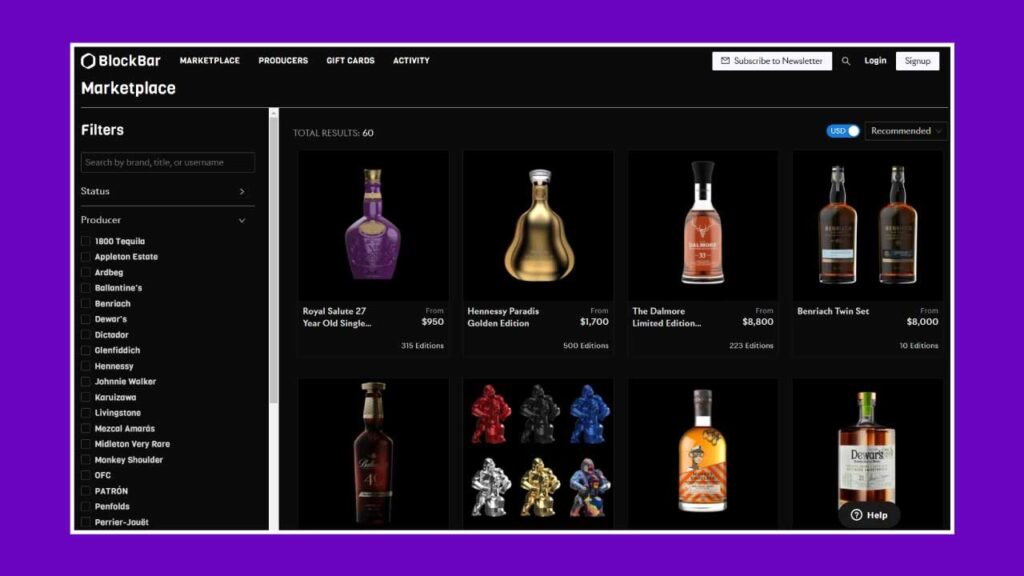
Ok, how does this marketplace work?
Through blockchain technology, Blockbar ensures authenticity and provenance while providing a seamless marketplace for collectors and producers.
Directly sourcing from producers, BlockBar mints NFTs as proof of ownership and authenticity, allowing for easy gifting, reselling, and storage.
Its state-of-the-art storage facility safeguards bottles while eliminating the need for physical movement until redemption.
At any time, the holder of the NFT may choose to burn (or redeem) the NFT in exchange for the physical bottle, which will be securely shipped to the owner directly from the Singapore facility.
An additional NFT will be transferred to the owner’s wallet to timestamp the redemption.
That’s cool, right?
William Grant and Son sold 15 bottles of 46-year-old Glenfiddich whisky for $18,000 each, accompanied by individual NFTs depicting artistic impressions of the bottles.
These NFTs serve as both a display of ownership and a counterfeit-proof certificate.
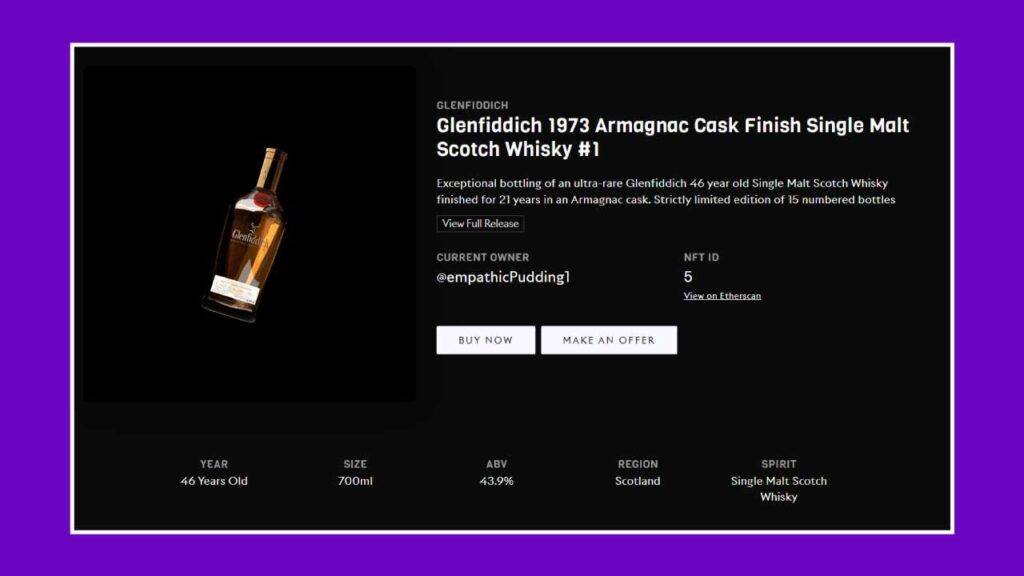
Despite the high price tag, it reflects the rarity of the whisky and the growing market for rare spirits as investments.
This is purely for marketing purposes.
Bacardi Rum announced a global marketing campaign titled “Do What Moves You,” focusing on dance-inspired activations during the summer months.
Events included a speakeasy-themed pop-up in New York in collaboration with Stadium Goods, where attendees can claim a Dancing Shoes NFT exchangeable for physical shoes.
A custom Snapchat AR lens featuring Bacardi’s commissioned song enhances the experience.
Why do all of this?
Bacardi aims to engage consumers globally through pop-up experiences, retail partnerships, and festival appearances, building on its “Do What Moves You” platform.
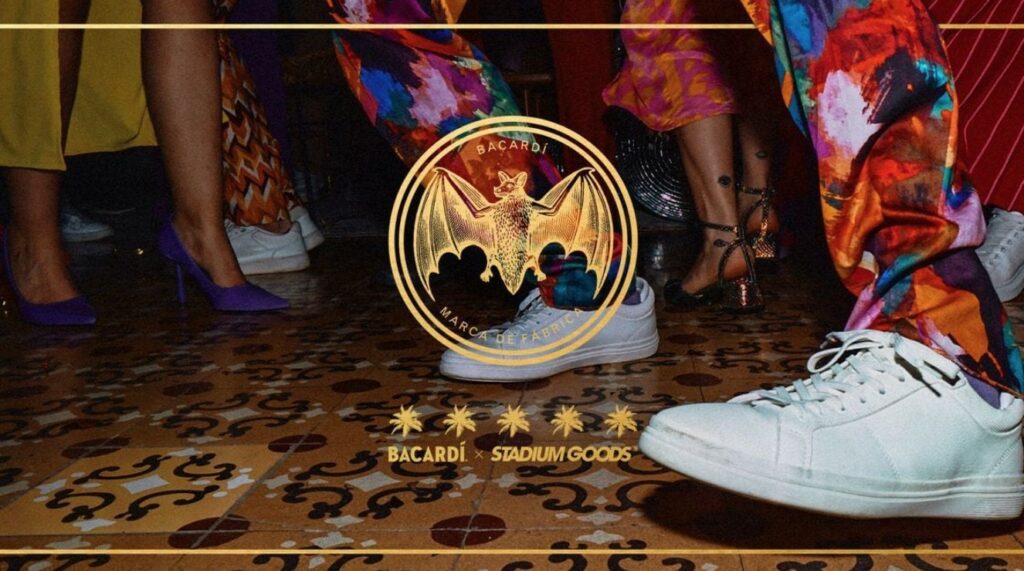
A DAO backed by real-world assets?
Dictador, renowned for its luxurious rum, collaborates with artist Mariusz Waras to create a futuristic collection of NFTs representing a city map.
These NFTs serve as membership tokens for the ArtHouse Spirits DAO, managing a treasury of rare rums.
Members decide on the treasury’s use, which includes transforming NFTs into physical bottles of rum. Dictador ensures the backing of real-world assets to maximize value potential.
This is what holding an NFT gives you access to, according to their whitepaper.
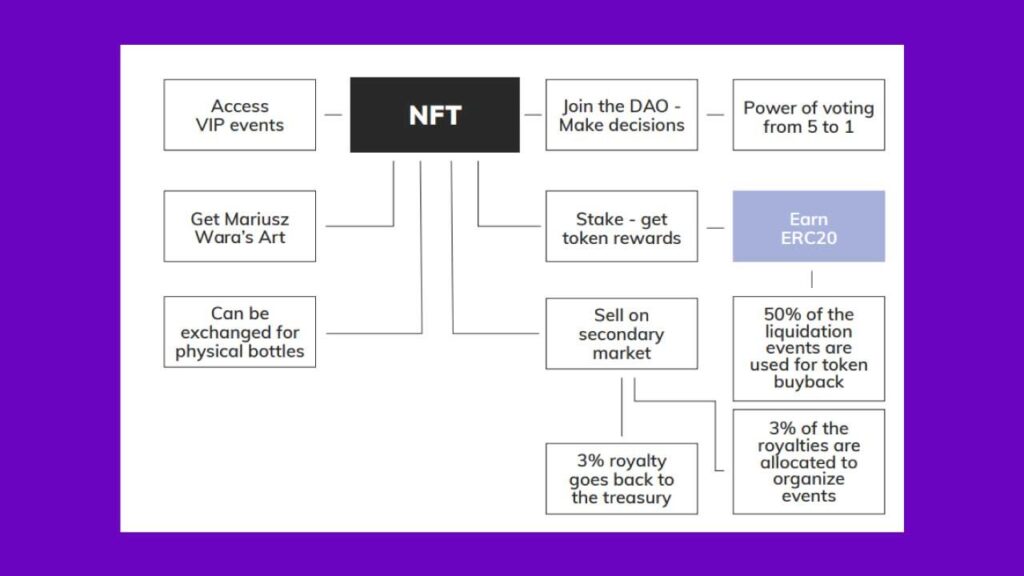
The Dalmore, a Highland single malt whisky, sold an entire cask of a 33-year-old Scotch whisky as 223 NFTs.
The first 10 bottles were made available to existing Block Bar NFT holders through a lottery, priced at US$8,800 each.
And these lucky buyers received an exclusive VIP experience at the Highland distillery, including paid-for flights.
The remaining 213 bottles were offered to the general public through pre-sale registration. Bottling of the cask occurred in early September, with physical bottles ready for collection in December 2022.
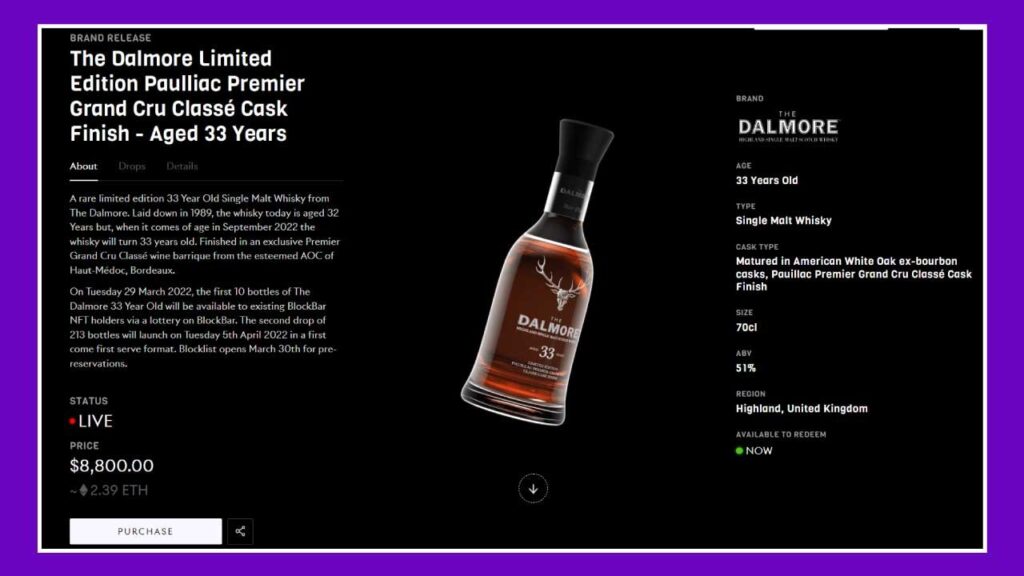
The integration of NFTs into the alcohol industry showcases a strategic fusion of technology and luxury, addressing key issues of authenticity and customer engagement.
Through NFTs, alcohol brands offer unique ownership experiences, from exclusive virtual events to access to rare spirits.
NFTs not only enhance marketing strategies but also provide a transparent and secure platform for collectors and enthusiasts alike to participate in the world of luxury spirits.